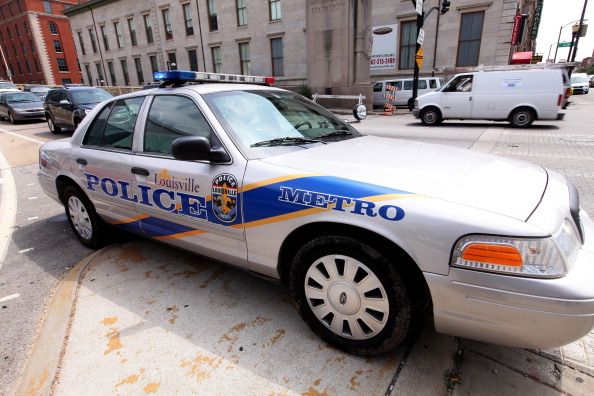A No-Knock Raid Was Executed On A Black Family By The Same Cops Who Raided Breonna Taylor’s Apartment
In the wake of Breonna Taylor‘s death “Insecure” actor Jay Ellis explored no-knock warrants during a new episode of his podcast titled, “The Untold Story: Policing.”
Ellis covers the Daugherty-Burr family, who recounts their experience when officers stormed their home using a battering ram and flash grenades while pointing automatic rifles during a “No-knock” raid in October 2018. The whole family including their three children, were home because they missed the school bus that morning.
This is what a “No-Knock” raid sounds and looks like. And it happens 60,000 times a year to unsuspecting families across the US. In this bonus episode of #TheUntoldStory: Policing, @JayREllis lays out why these keep happening & what we can do to end them: https://t.co/3dOMWcloYg pic.twitter.com/879xs4TGF1
— Lemonada Media (@LemonadaMedia) November 24, 2020
The Daugherty-Burr family only lives a few miles from Breonna Taylor’s apartment in Louisville, Kentucky. Five of the same police officers who raided their home were also part of the group who executed the raid on Taylor’s apartment, including Myles Cosgrove and Brett Hankison, the lone officer who charged with wanton endangerment in Taylor’s case. The family said they are still experiencing PTSD from the traumatic event.
“Since day one when we actually heard about Breonna Taylor, it was like, me and Ashlea we just kinda looked at each other and just like, just started crying, damn near you know? said Mario Daugherty. “It’s like man we were just in this same situation and we know that could’ve easily been us.”
The family put their story out there in hopes that the laws would be changed to eradicate no-knock raids. In June after Taylor’s death, the city of Louisville banned no-knock warrants.
There are only two standard types of raids, the “knock and announce” and the “no-knock” raid, where police are granted permission via a judge, to break into your home or apartment.
“It became part of Richard Nixon’s 1968 campaign which of course was heavily focused on to put it bluntly, making white people afraid of Black crime,” said Radley Balco, a journalist with The Washington Post who spoke with Ellis. The raids ramped up during the “war on violent crime,” with the belief that if raids were executed this way, it would give less time to dispose of drugs and-or evidence.
Police are only supposed to be granted a no-knock warrant if there is no other way to execute the warrant. However, what continues to happen is that police may knock and announce, but then wait less than 20 seconds to barge in.
This was the biggest point of contention in Taylor’s case. While the LMPD claimed they did announce, Kenneth Walker, Taylor’s boyfriend, said that he didn’t hear the officers, prompting him to open fire because he believed intruders were entering.
Experts believe this aspect of police militarization appeals to officers because it gives them a sense of invincibility. Dr. Pete Kraska, a criminologist at the Eastern Kentucky University School of Justice Studies who has studied police behavior for over 20 years says there’s a high value placed on militarism, which has become a luring part of American culture.
Kraska told Ellis there’s also a financial benefit to the raids, called civil asset forfeiture. It allows access to homes via a warrant to confiscate undocumented property (etc. drugs and cash). The law was intended initially to break down cartels and the mob with large assets.
A national database doesn’t exist, much like police-involved shootings, to keep track of police raids, but Kraska estimates that about 60,000 no-knock raids happen each year across the country, with a bulk occurring in areas with large minority populations.
Ellis also spoke with Black Lives Matter activists DeRay McKesson and Johnetta “Netta” Elzie lay out a plan to hold police accountable in ending no-knock warrants across the country which includes restricting all other warrant executions and heightening police accountability.
More information on no-knock raids visit endallknocks.org.
To listen to the full episode click here.
SEE ALSO:
21-Year-Old Breonna Taylor Protest Leader Hazma ‘Travis&’ Nagdy Killed In Fatal Shooting
[ione_media_gallery id=”4020001″ overlay=”true”]

